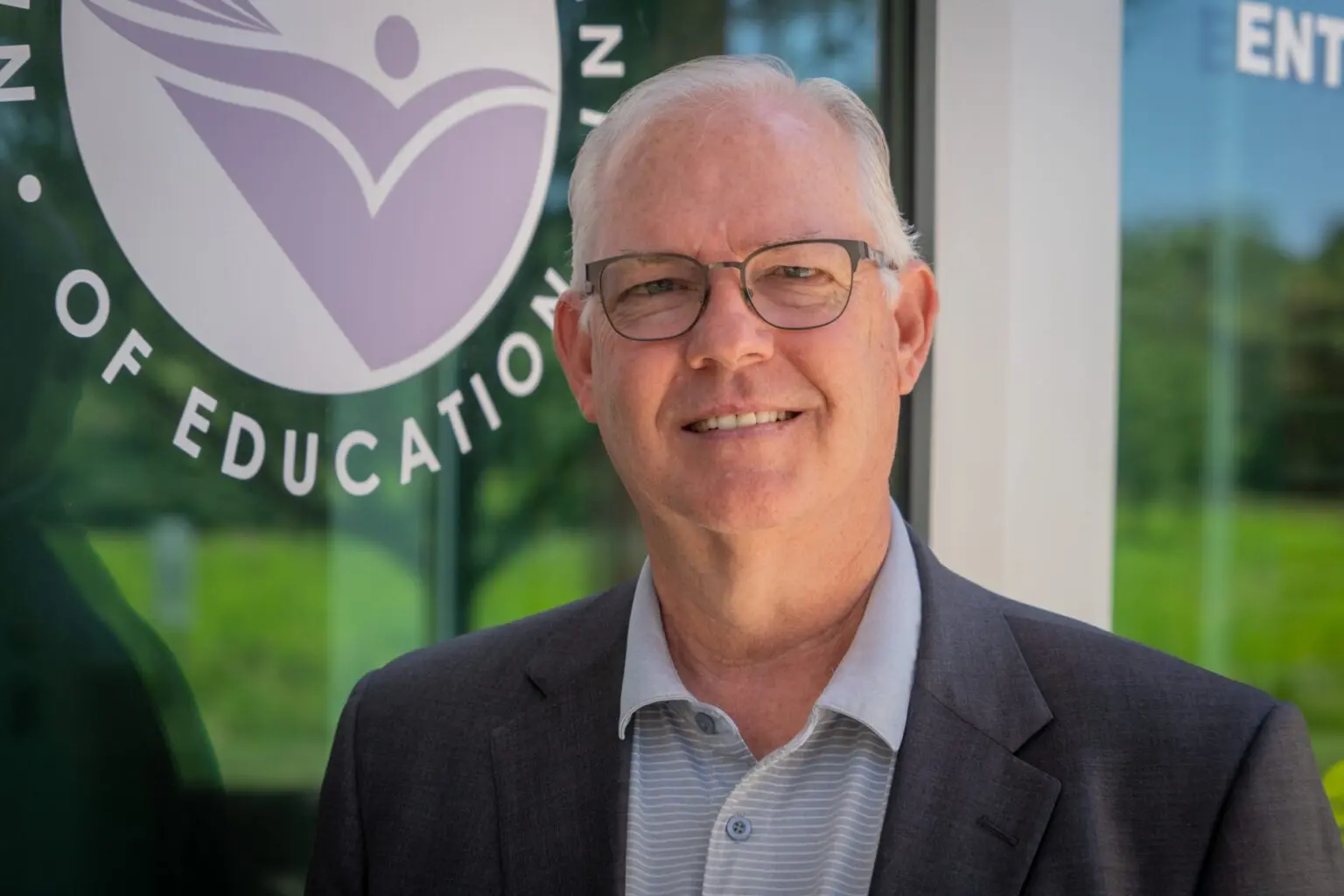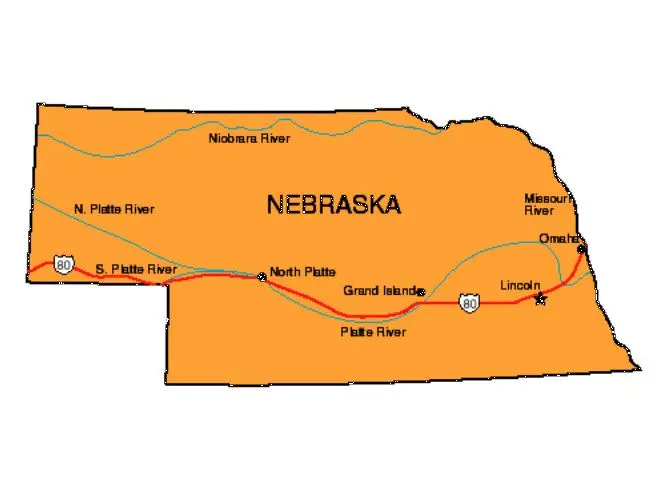
Zach Wendling
Nebraska Examiner
LINCOLN — The Nebraska Department of Education is moving ahead on priorities of literacy, chronic absenteeism and workforce development while navigating an ideologically divided governing board and federal uncertainty.
The State Board of Education has selected three legislative priorities for the Education Department through 2027, focused on increasing reading proficiency among Nebraska third graders to 75%, halving the number of school staffing vacancies and halving chronic absenteeism. The State Board hopes to accomplish all three goals by 2030.
Nebraska Education Commission Brian Maher says such progress might not be “intuitive” for the average Nebraskan, considering the 4-4 split on the officially nonpartisan board between registered Republicans and Democrats, which appointed Maher beginning July 2023.
However, Maher said the board has done a nice job pulling together, often unanimously, on many important topics, including what he terms “LAW” — literacy, attendance and workforce — while differences remain.
“The occasional flare-up that might have an appearance of dysfunction really gets noticed, but what doesn’t get noticed is all of the conversation, give and take on items of significance, like literacy, attendance and workforce,” Maher told the Nebraska Examiner in late June.
A ‘tenacity’ for literacy, numeracy
Maher said he didn’t bring the literacy improvement goal to the table, but he said if he has brought anything, it’s a “tenacity” to advance the “laser-focused” goal of reading improvement. The state Education Department has also enacted the “Nebraska Literacy Plan,” which is supported through funds from the Legislature and the federal government.
Legislative Bill 1284 of 2024, led by former State Sens. Lynne Walz of Fremont and Lou Ann Linehan of the Elkhorn area, appropriated a few million dollars to employ regional literacy coaches statewide and to mentor teachers in grades K-3 on how to better teach reading.
The focus is on training prospective teachers and getting literacy coaches directly in the classroom.
Maher said 2015, his last year as Kearney superintendent, was a high-water mark for student achievement, but since then, student test scores have declined. With a focus on the “Science of Reading,” a methodological research-focused view to teaching reading, Nebraska looks to improve the achievement trend. Maher notes that this was “by and large” how reading was taught years ago.
“It’s a little bit of going back to what we know works,” Maher said.
Maher said several educational service units in the state, publicly elected boards to assist and coordinate resources with school districts, have a literacy coach in place. He said the Education Department has met with those coaches to boost consistency statewide.
LB 1284 from Linehan and Walz, Maher said, “planted the seed” for the science of reading and quality coaching in a “very well-needed” three-year commitment.
‘Cross-sector’ collaboration
Maher said the Education Department is also engaging in the “cross-sector” issue of preparing students in K-12 for “whatever’s next.” That includes higher education partners and also the Nebraska Department of Labor and the Nebraska Department of Economic Development, work that includes developing apprenticeships.
While Nebraska’s chronic absenteeism rate has flatlined, Maher said, leaders must still reverse high absenteeism rates that “accelerated” as a result of the COVID-19 pandemic but had been declining before.
Maher said there is finally more research on addressing absenteeism, in addition to how a good teacher can make “all the difference in the world.”
He noted that without students in school, it’s hard to teach reading and math.
“We’ve got to find strategies in addition to that teacher who’s a unicorn and a pied piper to get kids to come to school,” Maher said.
U.S. Department of Education, federal funding
One of the questions Maher is preparing for is what happens if the U.S. Department of Education is eliminated, a goal of President Donald Trump and some congressional Republicans.
Maher said he’s had good conversations with state colleges, community colleges and the University of Nebraska to ask, “What if?” He said that has produced a rough “skeleton plan.”
“I get the question all the time, ‘What’s going on in Washington, D.C.?” and I really don’t know a lot more than the average citizen could know if they followed the reports coming out of D.C.,” Maher said.
He continued: “I tell people … I don’t want to panic. I don’t want to react on a rumor or an innuendo. I want to react on facts. To this point, I think we’ve done a really nice job of that. And I think our schools have done a really nice job of that.”
On whether eliminating the federal department would be “OK,” Maher says, “I need more detail.”
For example, what occurs with the Office of Special Education and associated funding, as well as funding for various Title programs that serve some of Nebraska’s most vulnerable students.
“If we can get satisfactory answers to those questions, it may make a lot of sense to actually shift some of the decision-making and some of the oversight to the state level,” Maher said. “I’m certainly not opposed to that happening, but I need a lot more of the questions answered before we dig into that.”
‘Having our voice valued’
Funding has also become tighter on the state level, and Maher said while his department has good relationships with the legislative and executive branches, more money might not always be the solution.
Instead, he said support in policymaking and “having our voice valued,” which he says the NDE voice is, is valuable.
“Let’s build from that strength in that relationship that already exists,” Maher said, wanting to focus on efficiency and maximizing current resources and expertise.
Maher, 63, announced his candidacy in early July for the University of Nebraska Board of Regents. He did so with the endorsement of all eight State Board of Education members. He and Lincoln entrepreneur Brent Comstock, 29, are the first to announce for the Lancaster County seat.
Maher noted the Nebraska Department of Education also includes a broader focus than a traditional definition of public, private and home schools. For example, NDE includes Vocational Rehabilitation and helping Nebraskans with disabilities “from birth to death,” including how to be employed and maintain employment while working with employers.
Maher said the “dynamic” leadership of the VR division, for example, is “phenomenal” but also a “best kept secret” that educational leaders want to highlight more.
NDE’s Disability Determination Services also helps determine taxpayers’ eligibility for Social Security.
Long-term planning
The State Board of Education and Education Department are now embarking on creating a strategic plan, which Maher said will likely cover five years. The final result will include feedback after about a dozen forums held statewide earlier this year, including in Nebraska City, Omaha, Valentine, McCook and Scottsbluff.
The hope is to get the plan approved by the end of the year and ready to go in January, Maher said. He would like it to focus around literacy, attendance and workforce.
“I think if we do those things really, really well, a lot of other things will fall in place,” Maher said.
Maher, who played football at Midland University, echoed longtime head football coach and athletic director for the Nebraska Huskers, Tom Osborne, who used to say that if players can block and tackle well, “winning will take care of itself.”
‘Eight good people’
Maher noted the “waters didn’t look perfect” when he returned to Nebraska in 2023 on a 5-3 vote (one Republican and all four Democratic members) after eight years in South Dakota, the past three as the CEO and executive director of the South Dakota Board of Regents.
As he entered his latest Nebraska role, the commissioner said he heard a lot about how he would need to pull the ideologically separated board together. The 2024 elections left the same board split 4-4, plus a moderate Republican who sometimes split ties, including on Maher’s appointment, declined to seek reelection. She was succeeded by a more conservative member.
Maher, a previous superintendent of Kearney Public Schools and Centennial Public Schools, said he received advice when he started that administrative work in 1999: have the audacity to lead, but also remember when the superintendent is the “hired help.”
While he works for the board, Maher said he must develop relationships with each member to figure out what makes them tick, their hot buttons and issues that could be a deal breaker. He said that sometimes means walking away from some issues, too, while making significant progress for Nebraska students in other areas.
Along those lines, he offers a third piece of advice: remembering he has “eight good people” who all fit into the education equation.
“If I can figure out how audacious I should be or when to step back and let the board make board decisions, but yet treat those eight individuals like the quality humans they all are, that can go a long way,” Maher said.
The value of education
Maher said he felt good when, in early June, the State Board of Education extended his contract initially set to end July 2026 to July 2027 in an 8-0 vote. He also received a 3.25% pay bump, to $325,237.50.
Maher has pledged to resign as education commissioner if elected regent in November 2026, meaning his tenure could end about six months sooner.
The native of Hooper says he tries to use common sense and work hard, and Maher said his passion has “never wavered, that it is about education” at all levels.
“I’ve loved every piece that I’ve been in, and when people ask me how this job is going, I say, ‘I love it.’ I do,” Maher said. “Now they think I’m a little bit nuts when I tell them that, but I do, because I think the work is so meaningful, and if you can be involved in education, I just think there’s something special about the impact that you can have in that space.”








